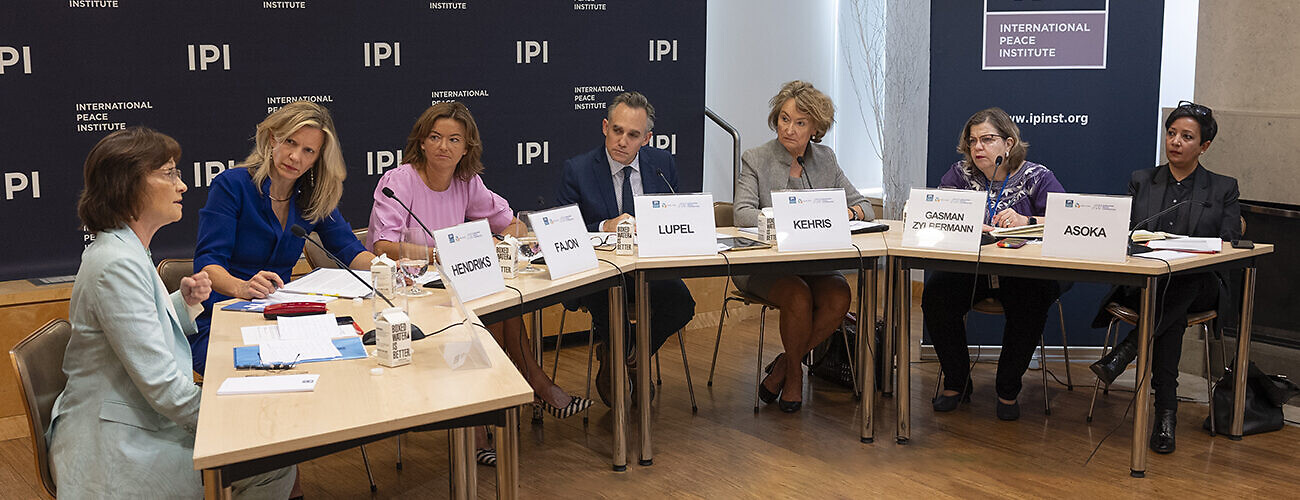IPI, together with the Permanent Mission of Ireland to the UN and the Sasakawa Peace Foundation, cohosted a Symposium on September 20th entitled “Innovations in Implementing the Women, Peace, and Security Agenda” in collaboration with the Permanent Missions of the Republic of Slovenia, Japan, Switzerland, and Mexico. The event brought together speakers from civil society, UN agencies, and UN member states.
For the past six years, IPI has organized a Symposium during the high-level week of the opening of the UN General Assembly in New York, dedicated to exploring various aspects of the Women, Peace, and Security agenda. This dedicated space aims to ensure that WPS is not only discussed within the UN Security Council during “WPS month” in October, but rather is integrated into broader high-level discussions at the UN and in the international community.
This year’s event aimed to build on the work of the Governments of Ireland, Mexico, and Kenya, which initiated “The Presidency Trio for Women, Peace and Security” during their time as elected members of the UN Security Council. This effort was designed to advance the implementation of the WPS agenda, presenting tangible actions that could be taken during consecutive Council presidencies to prioritize the WPS Agenda. This initiative led to the creation of the “Shared Commitments on WPS,” onto which all Security Council members are invited to sign. As of 2023, sixteen past and current Security Council members have signed onto the Shared Commitments since its inception. Today, all five newly-elected member countries to the Council have also pledged to prioritize the WPS Agenda. However, despite these commitments, leaders, policymakers, practitioners, researchers, and women across the world recognize the existing gap between verbal commitments and tangible implementation of WPS objectives.
During the event, panelists stressed the need for more robust political will and cross-sector collaboration to strengthen WPS commitments in the face of current global challenges such as polarization, divisions in the Security Council, and a global backsliding of women’s rights.
In his opening remarks, H.E. Micheál Martin TD, Deputy Prime Minister and Minister for Foreign Affairs and Defence of Ireland, framed the discussion, stating: “It’s a simple and clear fact that women must be involved in making the policies that shape our lives and livelihoods.” The panel discussion that followed was stressed the urgent need to advance the WPS agenda through coalition networks, strategy, and action at the international, national, community, and civil society levels in order to comprehensively implement the WPS agenda across sectors.
H.E. Tanja Fajon, Minister of Foreign and European Affairs from Slovenia, highlighted the need to refocus the Security Council’s agenda to prioritize the WPS agenda, addressing the challenges faced by women in conflict settings and promoting women’s leadership in conflict mediation and negotiations.
Panelists also acknowledged existing transformative initiatives to advance the WPS commitments and stressed the importance of creative solutions for their effective implementation.
H.E. Pascale Baeriswyl, Permanent Representative of Switzerland, noted that the groundbreaking nature of UN Resolution 1325 which first introduced the WPS agenda in the UN Security Council. However, she emphasized the continuing need for greater political will and leadership among Security Council members to ensure its effective implementation.
Dr. Nadine Gasman Zylbermann, President of the National Women’s Institute in Mexico (Instituto Nacional de las Mujeres) stressed the importance of National Action Plans (NAPs) in implementing the WPS agenda. “Peace needs an expression nationally,” she stated, urging the more robust participation of women at all levels of peacebuilding, especially the national level, and the importance of strengthening NAPs to better realize this goal.
Sarah Hendriks, Deputy Executive Director for Policy, Programmes, Civil Society and Intergovernmental Support at UN Women, expressed concern about the reduction of references to the WPS agenda in UNSC resolutions, emphasizing the need for stronger language and activism to incorporate the WPS agenda in all resolutions.
Ilze Brands Kehris, UN Assistant Secretary-General for Human Rights noted that women civil society briefers are most at risk when they are invited to brief the Security Council. This must be rectified to ensure that women can participate meaningfully and safely in international peace and security forums. She called for a “briefer-centered” approach to ensure protection and empowerment at the highest levels of international convenings.
Also stressing the importance of women’s participation, Kaavya Asoka, Executive Director of the NGO Working Group on Women, Peace and Security, highlighted the need to protect women human rights defenders at the community level and stressed the low representation of women in peace processes, indicating substandard implementation of UNSCR 1325. Member states were urged to insist on women’s participation and call out resolutions that do not include language on the WPS agenda.
Finally, in her concluding remarks, H.E. Kamikawa Yōko, Foreign Minister of Japan, recognized the importance of taking action at the national level to implement the WPS agenda, citing the establishment of a Parliamentary League on WPS in Japan as an example. Inspired by her participation at the 2022 Women, Peace and Leadership Symposium, she emphasized the incorporation of WPS into Japan’s basic policies on economic and fiscal management and reform in 2023, influencing Japanese budgetary processes.
Welcoming Remarks:
Dr. Zeid Ra’ad Al Hussein, President and CEO of the International Peace Institute
Opening Remarks:
H.E. Micheál Martin TD, Tánaiste and Minister for Foreign Affairs and Defence, Ireland
H.E. KAMIKAWA Yōko, Minister for Foreign Affairs, Japan
Speakers:
H.E. Tanja Fajon, Deputy Prime Minister and Minister of Foreign and European Affairs, Slovenia
H.E. Pascale Baeriswyl, Permanent Representative of Switzerland to the UN
Dr. Nadine Gasman, President of the National Institute of Women, Mexico
Sarah Hendriks, Deputy Executive Director a.i. for Policy, Programmes, Civil Society & Intergovernmental Support, UN Women
Ilze Brands Kehris, Assistant Secretary-General for Human Rights at the UN
Kaavya Asoka, Executive Director, the NGO Working Group on Women, Peace and Security
Moderator:
Dr. Adam Lupel, Vice President and COO, International Peace Institute








